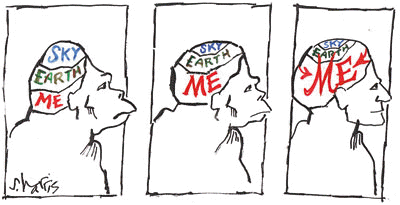
Homo??

Julian Cribb
|
Opinion- 18 August 2011 |
|
Homo?? |
Julian Cribb* -- The Case for Re-naming the Human Race |
 Julian Cribb |
This opinion piece is reprinted with the permission of www.sciencealert.com.au and the author.
An abbreviated version appeared as "correspondence" in Nature 476, 282
(18 August 2011) doi:10.1038/476282b.
____________________________________________
It
is time the human race had a new name. The old one, Homo sapiens –
wise or thinking man – has been around since 1758 and is no longer a fitting
description for the creature we have become.
When the
Swedish father of taxonomy Carl Linnaeus first bestowed it [i],
humanity no doubt seemed wise when compared with what scientists of the day knew
about both humans and other animals. We have since learned our behaviour is not
as wise as we like to imagine – while some animals are quite intelligent. In
short it is a name which is both inaccurate and which promotes a dangerous
self-delusion.
In a
letter to the scientific journal Nature (476, Aug 18, 2011) I have
proposed there should be a worldwide discussion about the formal
reclassification of humanity, involving both scientists and the public. The new
name should reflect more truthfully the attributes and characteristics of the
modern 21st century human – which are markedly different from those
of 18th century ‘man’. Consider, for example, the following.
Humans
are presently engaged in the greatest act of extermination of other species by a
single species, probably since life on Earth began. We are destroying an
estimated 30,000 species a year - a scale comparable to the great geological
catastrophes of the past.[ii]
We
currently contaminate the atmosphere with 30 billion tonnes of carbon equivalent
a year.[iii]
This risks an episode of accelerated planetary warming reaching 4-5 degrees by
the end of this century and 8 degree by the middle of next century – a level at
which food production would be severely disrupted, posing a serious risk to all
members of an enlarged human population.[iv]
We have
manufactured around 83,000 synthetic chemicals [v],
many of them toxic, and some of which we inhale, ingest in food or water or
absorb through the skin every day of our lives. A 2005 US study found newborn
babies in that country are typically contaminated by around 200 industrial
chemicals, including pesticides, dioxins and flame retardants
[vi].
An EU study (2010) found compelling evidence that even
harmless chemicals can recombine with one another to form poisons.[vii] These chemicals are now found all over the planet, even
at the poles and in the deep oceans and new ones, of unknown hazard, are being
produced all the time. Yet we wonder at the rise in cancers and ‘mystery’
illnesses.
Every
year we release around 121 million tonnes of nitrogen, 10 million tonnes of
phosphorus and 10 billion tonnes of CO2 (which causes acidification) into our
rivers, lakes and oceans – many times more that the Earth recirculates
naturally. This is causing the collapse of marine and aquatic ecosystems,
disrupting ocean food chains and replacing them with ‘dead zones’ that no longer
support life. The number of these found has risen to over 400 in recent years. [viii]
We are
presently losing about one per cent of the world’s farming and grazing land
every year to a combination of erosion, degradation, urban sprawl, mining,
pollution and sea level rise.[ix]
The situation has deteriorated in the last 30 years, confronting us with the
challenge of doubling food production by 2060 off a fraction of remaining land.
At the same time we waste a third of the world’s food.
[x]

Credit: Nature / S. Harris
Current
freshwater demand from agriculture, cities and energy use is on track to double
by mid century, while resources in most countries – especially of groundwater –
are drying up or becoming so polluted they are unusable.[xi]
Humanity
passed peak fish in 2004[xii],
peak oil in 2006
[xiii] and is likely to encounter growing scarcities of other
primary resources, including mineral nutrients, in coming decades. Yet our
demand for all resources – including minerals, energy and water – will more than
double, especially in Asia. If all the world were to live like contemporary
Australians or Americans, it would require four planet Earths to satisfy their
wants, says the Global Footprint Network.[xiv]
Humans
invest $1.6 trillion a year in new weapons
[xv] – but only $50 billion a year in better ways to
produce food. Despite progress in arms reduction, the world still has around
20,000 nuclear warheads and at least 19 countries now have access to them or to
the technology to make them
[xvi]
Finally,
we are in the process of destroying a great many things which are real – soil,
water, energy, resources, other species, our health – for the sake of something
that exists chiefly in our imagination: money. To trade something real
for something imaginary hardly appears wise.
Finally,
as growing number of eminent scientists are now saying, these things carry the
risk of catastrophic changes to the Earth’s systems, deleterious not only to our
own future but that of all life.
When
these issues are considered, it is difficult to justify a single epithet of
‘wise’, let alone two of them. Our official sub-species name is Homo sapiens
sapiens (‘wise wise man’), which now looks not only like conceit – but
insecurity. Such a name sends a misleading signal about the capacity – let alone
the will – of humanity, as a whole, to manage the consequences of its own
actions. It invites us to overestimate our abilities and underestimate the
difficulties we are creating.
This is
not to deny or belittle any of the great, creative, artistic or scientific
achievements of humans today or over the centuries, which are indeed wonderful.[xvii]
Rather it is to recognise that our present behaviours combined with our numbers
now have the capacity to nullify or even eliminate all other human
accomplishments.
The human
population is currently on track to reach 10 billion or more by the end of the
century[xviii] and this is a primary concern. An even greater one is
our ungovernable appetite – for food, for material resources, for energy, for
water, for land – and our lack of wisdom when it comes to managing and reusing
these resources.[xix]
A
creature unable to master its own demands cannot be said to merit the descriptor
‘wise’. A creature which takes little account of the growing risks it runs
through its behaviour can hardly be rated thoughtful. The provisions of the
International Code on Zoological Nomenclature provide for the re-naming of
species in cases where scientific understanding of the species changes, or where
it is necessary to correct an earlier error. I argue that both those situations
now apply.
However
this is not merely an issue for science: it concerns every one of us. There
needs to be worldwide public discussion about an appropriate name for our
species, in the light of our present behaviour and attributes.
Further
down the track I would not rule out an eventual return to the name Homo
sapiens, provided we can demonstrate that we have earned it – and it is not
mere flatulence, conceit or self-delusion.
Two years
ago another Swedish scientist, Johan Rockstrom and his international colleagues
(including Australians Will Steffen and Terry Hughes) identified 10 planetary
‘boundaries’ which we ought not to transgress because of the damage it will
cause to our world and our chances of surviving in it.[xx]
They found we had already crossed three. These boundaries can be used as a
report card on the human race: our success in remaining within them will be a
direct measure of our wisdom - and of our determination to survive both as a
species and a civilisation.
The wisdom to understand our real impact on the Earth and all life is the one we most need at this point in our history, in order to limit it.
[i] Homo sapiens Linnaeus 1758. http://www.eol.org/pages/327955
[ii] See, for example, Eldredge N., The Sixth Extinction, http://www.actionbioscience.org/newfrontiers/eldredge2.html
[iii] Harvey F. Worst ever carbon emissions leave climate on the brink. The Guardian, 29 May 2011.
[iv] See Schnellnhuber HJ, Climate Change – the Critical Decade. (video) http://www.aclimateforchange.org/profiles/blogs/climate-change-the-critical
[v] US EPA Chemical Substances Inventory (2011)
[vi] Environmental Working Group, 2005. http://www.ewg.org/reports/bodyburden2/execsumm.php
[vii] EU State of the Art Report on Chemical Mixtures, Universities of London and Goteborg. 2009
[viii] Diaz RJ and Rosenberg R, Spreading Dead Zones. Science, June 2008.
[ix] See for example Bai ZG, Dent DL, Olsson L, Shaepman ME, Global Assessment of Land Degradation and Improvement, FAO LADA & ISRIC 2008
[x] Global food losses and food waste, FAO, 2011
[xi] Chartres C and Varma S, Out of Water, FT Press 2010
[xii] FAO State of World Fisheries 2010
[xiii] Birol F, IEA 2010.
[xiv] GFN 2010. http://www.footprintnetwork.org/en/index.php/GFN/page/world_footprint/
[xv] SIPRI 2011, http://www.sipri.org/research/armaments/milex/resultoutput/trends
[xvi] Nuclear weapons: who has what? Arms Control Association 2011. http://www.armscontrol.org/factsheets/Nuclearweaponswhohaswhat
[xvii] See for example Civilisation by Kenneth Clarke and The Ascent of Man by Jacob Bronowski
[xviii] UN Population Division: World Population Prospects – the 2010 Revision.
[xix] Cribb JHJ, The Coming Famine: the global food crisis and what we can do to avoid it. University of California Press 2010.
[xx] Rockstrom R et al. A safe operating space for humanity. Nature 461, 472–475; 2009